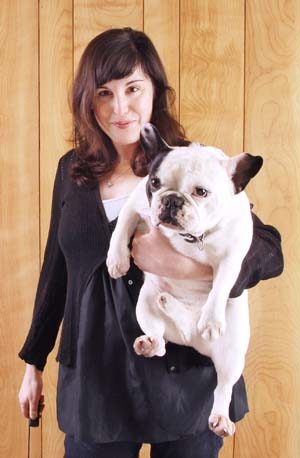Feminist pop culture critic and aficionado Andi Zeisler talks the state of entertainment, queer representation and why she just can’t leave her Facebook alone.
Andi Zeisler has said that when she and college friend Lisa Jervis decided to start Bitch: Feminist Response to Pop Culture, a zine devoted to criticizing images of women in popular culture, the title was clear.
“Is it a bad word? Of course it is,” she wrote in the Washington Post. It refers to a woman who misbehaves, who’s angry and loud, who points out everything that’s wrong with the world.
And that’s why, she says, “No other title was even up for consideration.” For nearly 15 years, their unruly brainchild has delighted and provoked anyone interested in how pop culture hurts or helps women. Seal Press recently released Zeisler’s Feminism and Pop Culture as part of its Seal Studies series, complete with readers’ guides and extensive bibliographies to accompany Zeisler’s incisive, impeccably researched essays on the relationship between the women’s movement and mass culture from the 1940s to the present. Zeisler deconstructs major pop-culture phenomena and provides a comprehensive introduction to key concepts that might even release your inner bitch.
As someone who has her own guilty pleasures, I have to ask: How do you manage to spend so much time criticizing pop culture when it’s obvious that you also kind of love it?
I think I’m able to like the actual products themselves a lot more now than I did 13 years ago when we started Bitch. I’m much more likely to see the positive aspects of what I’m consuming—which doesn’t mean that I don’t see the negative ones, just that I’m choosing to focus on what’s interesting to me. Seeing another in a series of 3 zillion commercials where a housewife is enthusing about a cleaning product is vaguely annoying, but I’d rather concentrate on how much I like the female lead character on the new HBO drama or whatever.
[But] I definitely don’t see being obsessed with pop culture as the same thing as loving it, or even loving to hate it. It’s a huge part of our lives and, starting from when we’re very young, a significant way that we define ourselves, find our friends, learn about the world. A lot of people I know who are my age and older grew up with a kind of ageist, classist idea of what pop culture meant—the idea that you sort of matured out of pop culture and into high culture. You stopped watching TV and started seeing only films with subtitles; you stopped going to bars to hear bands and started going to the symphony. That mindset probably still exists, but there’s just so much more pop culture now, and so much more that is considered pop culture—like politics—that the line between high culture and mass culture has dissolved.
Something that’s really funny for me is meeting people who, when they find out what I do, are really excited to confess their pop-culture obsessions but are also like, “Don’t judge me!” Like I’m going to judge you for loving Supernanny? I watched two seasons of Temptation Island!
Some people argue that certain representations of women — especially queer women, women of color, and other marginalized groups — may not be so positive now, but are “a good start.” I’m thinking here of the relative homogeneity of the characters on The L Word, or even the moderate politics of Hillary Clinton and Barack Obama. What do you think the right response to that is?
I think any time there’s a representative of a marginalized or minority population in a breakout show or band or whatever, there are going to be people who don’t feel truly represented and are resentful that they’re expected to feel satisfied with one or two people or fictional characters who are maybe sort of like them. I would never tell anyone that they should be happy, say, that there’s a transgendered character on The L Word or that they should now expect to feel understood and validated in the larger world. It’s not helpful if the representations don’t do anything to combat stereotypes: I would imagine, for instance, that people who were longing for more representation of bisexual folks in pop culture weren’t necessarily hoping for Tila Tequila.
You end your book with a call to make pop culture better. How can we do that?
If you cruise around YouTube, there are people constantly responding to, reworking and spoofing TV shows and advertisements. And there’s great industry criticism like Entertainment Weekly and sites like Television Without Pity constantly nudging the bigwigs behind the studios and the publishing houses, reminding them that without fans there is no pop culture. It’s easy to assume that consumers are less discerning because there’s so much more crap out there to consume, but you could also make the opposite argument: Pop culture is getting better because there is so much to choose from and because, increasingly, there’s the option to not simply consume, but to create.
